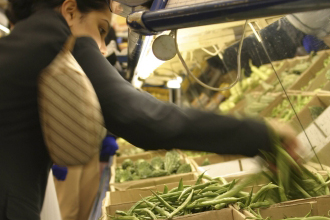英国超市的大学学期始学生收付在线购物订单数量有所增加。这并非因为学生们懒到不去购物的地步,而是因为他们的母亲担心他们的饮食不健康。
众所周知,学生们往往有不良的饮食习惯。最近,一名学生应《卫报》之约对自己连续三天的饮食进行了记录,并交由营养学家评价。
 Food parcels
Food parcels
Supermarkets in the UK report increases in online shopping orders being delivered to students at the start of university terms – not because the students are too lazy to go shopping themselves, but because their mothers are worried that they are not eating healthily!
Students are notorious for having bad eating habits. Recently the Guardian newspaper asked one student to record what he ate over a three day period, and then asked a nutritionist to comment.
Day one
10am Can of mango juice, Nutri-Grain (cereal) bar.
1pm Steak, chips, cauliflower. Twix* and water.
4pm Large bowl of Crunchy Nut Cornflakes (cereal) with milk.
8pm Two cans of mango juice, three bacon sandwiches (two rashers in each, no butter).
11pm Milky Way*.
Day two
10am Crunchy Nut Cornflakes with milk.
1pm Water, Galaxy Ripple*, coronation chicken sandwich, packet of McCoys crisps.
7pm Three cheese toasties, bowl of Crunchy Nut Cornflakes.
Day three
10am One Danish pastry, two chocolate croissants, bowl of Raisin Wheats (cereal).
2pm Burger and chips, Diet Coke.
7pm Spaghetti bolognese, ice cream.
*Twix, Milky Way and Galaxy Ripple are all brands of chocolate bar.
What the nutritionist said
What you eat has a direct impact on your health. According to The Guardian’s nutritionist this student’s diet is lacking in unrefined carbohydrates such as wholemeal bread and wholegrain cereals which can help reduce the risk of heart disease and certain cancers.
However, the nutritionist did say that it was good that the student’s diet actually included breakfast. This can help concentration and so could be useful for early lectures and seminars!
The student wasn’t so good about including fruit and vegetables in his diet though – nothing apart from mango juice and cauliflower on day one. Recommendations are for five portions* of fruit and vegetables each day.
The chocolate, fast food and crisps that the student eats might also have an impact on long-term health – instead of snacking on chocolate, the nutritionist suggested the student should carry either fresh or dried fruit as a snack.
Healthy eating on a budget?
Students' habits of eating unhealthily could be because many go to university with very little idea about preparing food or budgeting.
Cash-strapped students will usually pay fixed bills first and squeeze their food budget accordingly. This means that their food budget depends on what money they have left after paying other bills, rather than the money they actually need to buy food.
It would be better if they looked at their budget as a whole and allocated it appropriately.
They will often also mistakenly assume that fast, convenience food is a cheaper way to eat than cooking simple dishes such as pasta or casseroles.
Tips for a healthier student diet include keeping healthy snacks with you; buying tinned beans and pulses, fish, rice and pasta which can be easily stored; making healthier choices in the canteen and shopping locally for fruit and vegetables rather than at supermarkets, as they will usually be cheaper.
*The Food Standards Agency recommends that a portion should equal 80g of fruit or vegetables and that there should be variety in the five portions that you eat.
点击查看本频道更多精彩内容